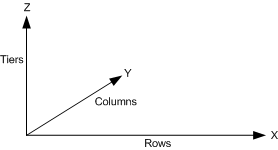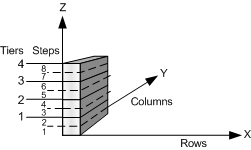
A container (or other type of equipment) in a stack has a precise position or slot name. N4 applies a logical three-dimensional coordinate system to each block, as illustrated in the figure.
Figure: Three-dimensional coordinate system

Row (x-axis)
Row definition depends upon the block type:
For transverse access blocks (RTG, forklift, and top-pick), the row is constant for a cross-section or bay.
For longitudinal access blocks (straddle carrier), the row is constant along the straddle run.
For wheeled parking blocks, the row is constant along an aisle.
Figure: Example of row definition per block type

Column (y-axis)
Column definition is the second division of block space.
Table: Column definition
|
Code |
Name |
X and Y coordinate layout |
|---|---|---|
|
C |
Chassis |
|
|
F or T |
Forklift, top-pick, or transtainer (RTG) |
|
|
S |
Straddle |
|
Steps and Tiers (z-axis)
Steps and tiers are vertical coordinates. Steps are approximately 4’ high spaces to stow half-height containers. Tiers are comprised of two steps. The tier-step relationship is fixed.
The illustration shows the four-high stack of normal (full-height) containers has (from the bottom to the top) tier coordinates of 1, 2, 3, and 4 and step coordinates of 2, 4, 6, and 8.
Figure: Tier-step relationship

The step coordinate for a container refers to the highest step that the container occupies. A full-height container (8' to 9'6") is assumed to occupy two steps and other special containers (such as auto frames) can occupy three steps.